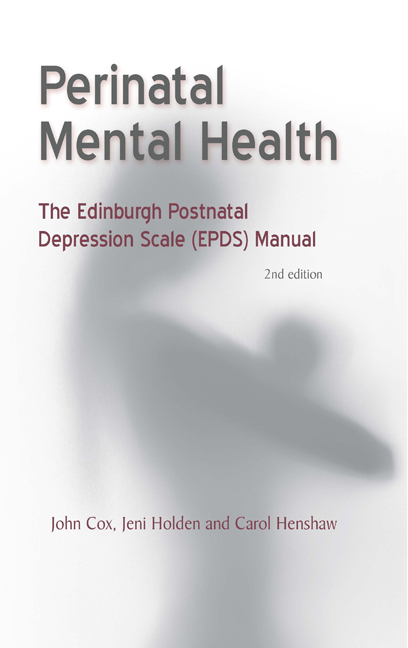Book contents
- Frontmatter
- Contents
- The authors
- Acknowledgments
- Abbreviations
- List of figures
- Foreword
- Preface to the first edition
- Preface to the second edition
- 1 Postnatal depression: an overview
- 2 The origins and development of the Edinburgh Postnatal Depression Scale
- 3 International and cross-cultural issues
- 4 Using the Edinburgh Postnatal Depression Scale in clinical settings: research evidence
- 5 Humanistic and person-centred interventions in perinatal depression
- 6 Screening and intervention services in the community
- 7 Using the Edinburgh Postnatal Depression Scale
- Appendix 1 The Edinburgh Postnatal Depression Scale
- Appendix 2 Translations of the Edinburgh Postnatal Depression Scale
- References
- Index
Preface to the second edition
- Frontmatter
- Contents
- The authors
- Acknowledgments
- Abbreviations
- List of figures
- Foreword
- Preface to the first edition
- Preface to the second edition
- 1 Postnatal depression: an overview
- 2 The origins and development of the Edinburgh Postnatal Depression Scale
- 3 International and cross-cultural issues
- 4 Using the Edinburgh Postnatal Depression Scale in clinical settings: research evidence
- 5 Humanistic and person-centred interventions in perinatal depression
- 6 Screening and intervention services in the community
- 7 Using the Edinburgh Postnatal Depression Scale
- Appendix 1 The Edinburgh Postnatal Depression Scale
- Appendix 2 Translations of the Edinburgh Postnatal Depression Scale
- References
- Index
Summary
The Edinburgh Postnatal Depression Scale (EPDS) has continued to be used throughout the world by clinicians and researchers since the first edition of this book was published in 2003. Its ten items and simple scoring method have remained unchanged for almost three decades and when used as we intended the EPDS has outlasted most of its initial criticisms.
The suggestion of a second edition of our book has therefore been warmly welcomed; it has given us the opportunity to welcome Carol Henshaw as a third author. Carol was a former academic colleague at Keele University and presently works as a consultant perinatal psychiatrist in Liverpool. As a Past President of the Marcé Society she is also well placed to ensure the book's relevance to the postmodern world in which we live, and to help us make sure that the different clinical contexts in which the EPDS is used are fully recognised.
By 2030, depression is predicted to be the leading cause of disability, with only HIV/AIDS and perinatal disorders higher for low- and middleincome countries (Mathers & Looncar, 2006). In the UK there have been striking changes in the delivery of perinatal services, with an emphasis on quality standards and agreed care pathways. It is a key advance that the National Health Service (NHS) in England has included perinatal services within the remit of a separate Specialised Services Commissioning Board which was established in April 2013. In low-income countries, perinatal mental health and the impact of perinatal mental disorder on the developing infant and on educational attainment is now a more widely acknowledged public health priority.
We have updated all the chapters and their references, included a list of the 57 languages and the EPDS translations known to us, modernised the screening sections and re-emphasised the continuity of depression before and after birth in at least a third of mothers, but have left largely unaltered the balance of the book and the preface to the first edition which drew attention to humanistic values and to the need to ensure the questionnaire's cultural validity.
- Type
- Chapter
- Information
- Perinatal Mental HealthThe EPDS Manual, pp. xvi - xviiiPublisher: Royal College of PsychiatristsPrint publication year: 2014



